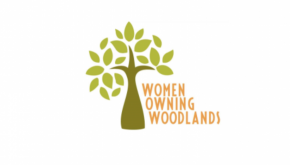
Written by Annica McGuirk, originally posted by National Association of Conservation Districts
Woman Owning Woodlands is a resource for women landowners and forest stewards. According to their website, “The Women Owning Woodlands (WOW) web project strives to bring topical, accessible, and current forestry information to woodland owners and forest practitioners through news articles, blogs, events, resources, and personal stories. We support women in forest leadership, women who manage their own woodlands, and all who facilitate the stewardship of forests.”
The WOW network is national in scope and works at the local level with chapters and conservation professionals to offer women-focused woodland management content. They support female forest landowners in seeing their woodland management goals realized through skill-building opportunities and connecting them with necessary resources.
Conservation Districts show up in various ways in this work by offering these workshops, engaging with the local WOW chapters, and supporting these female forest landowners in realizing their management goals. In Maine, Piscataquis County Soil and Water Conservation District (PCSWCD) has been engaged in WOW for some time. They offer chainsaw safety 1-3 and a variety of management workshops geared towards female forest landowners and provide the skill-building opportunities necessary to make them successful woodland managers. Like many districts, the community’s needs drove the interest towards offering this type of specialized content, and they’ve seen continued and growing interest in attendance. “We started with chainsaw safety, and participants continued to ask for the next course and more workshops. We now offer chainsaw 1-3 as well as a variety of hands-on workshops aimed at helping these landowners take home the necessary skills to do this work themselves,” said Sarah Robinson, Executive Director, PCSWCD.
In addition to these successful workshops, PCSWCD recently secured a Maine Community Foundation Grant, which they’ll use to update the forest management plan of their demonstration forest, Williamsburg Forest. With a focus on EQIP-approved conservation practices, forestry for Maine birds habitat management goals, and building the forest into a WOW skill-building ground. The forest will be re-imagined as “Forests for Everyone, Managed by Women” and involves various local partners, including the Maine Forest Service, the Penobscot Indian Nation, and other local, state, and federal partners. The site will help landowners see EQIP practices in action and give a working space for female forest landowners to practice management skills learned through PCSWCD’s WOW programming. The Holmes Soil and Water Conservation District (HSWCD) has recently begun engaging with workshops geared towards female forest landowners in Holmes County, Ohio. Community interest and lack of similar programing for female landowners drove their first event this April. They saw an opportunity to be a convener for the community and for those with forestland that wasn’t being managed. “We wanted to be that connector, to help someone that has ground and help them understand how to manage it better. To connect them with resources”, said Karen Gotter, Watershed Coordinator for Killbuck Creek, HSWCD. Inspired by regional programming geared towards female agriculture producers, Women4TheLand, HSWCD began putting together this event and engaging with local partners, including the Ohio Division of Forestry, to offer the programming. The southeast part of the state is home to a WOW chapter, the Southeast Ohio Chapter of the Women Owning Woodlands Network, but nothing currently exists at that scale in Holmes County.
With support from their local service forester, HSWCD began imagining how they could meet needs through offering this programming. There was some trepidation around restricting participation, but ultimately the value and benefit were clear for creating space for these women landowners to engage with practical, skill-building workshops and was further driven by a clear interest in the community. “I see an opportunity to engage with a new subset of landowners, even the next generation of those landowners. These events are reaching a brand-new audience for the district”, said Karen Gotter.

